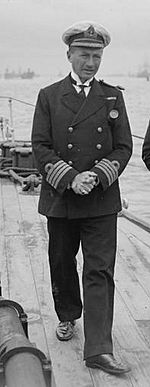Barry Domvile facts for kids
Quick facts for kids
Sir Barry Domvile
|
|
|---|---|
 |
|
| Born | 5 September 1878 |
| Died | August 13, 1971 (aged 92) |
| Allegiance | |
| Service/ |
|
| Rank | Admiral |
| Commands held | HMS Miranda HMS Tipperary HMS Centaur HMS Curacoa HMS Royal Sovereign Royal Naval College, Greenwich |
| Battles/wars | World War I |
| Awards | Knight Commander of the Order of the British Empire Companion of the Order of the Bath Companion of the Order of St Michael and St George |
Admiral Sir Barry Edward Domvile (born 5 September 1878, died 13 August 1971) was a high-ranking officer in the Royal Navy. He was known for his long naval career. However, he was also held by the government during World War II. This was because he showed support for some ideas of the Nazi party.
During the 1930s, he expressed support for Germany's leader, Adolf Hitler. He also held views that were against Jewish people.
Barry Domvile followed his father into the Royal Navy in 1892. His father was also an Admiral, Sir Compton Domvile.
In 1912, Barry Domvile became an Assistant Secretary. He worked for the Committee of Imperial Defence. This group helped plan Britain's defense.
During World War I, he commanded several ships. These included the destroyer HMS Miranda. He also commanded the destroyer HMS Tipperary. Later, he led the cruiser HMS Centaur. Finally, he commanded the cruiser HMS Curacoa.
After the war, he continued to rise in the Navy. In 1920, he became the Director of Plans. He helped create strategies for the Navy. In 1922, he became the Chief of Staff for the Mediterranean Fleet. This meant he was a top assistant to the commander in that area.
In 1925, he took command of the battleship HMS Royal Sovereign.
From 1927 to 1930, he was the Director of Naval Intelligence. This role involved gathering important information for the Navy. He then commanded the Third Cruiser Squadron from 1931 to 1932. His final role was President of the Royal Naval College, Greenwich. He held this position from 1932 to 1934.
Views and Activities
In 1935, Domvile visited Germany. He was impressed by some parts of the Nazi government. He was even invited to a large event in Germany in 1936. This event was called the Nuremberg Rally. He attended as a guest of the German Ambassador.
Domvile became involved with groups that supported closer ties with Germany. He joined the Anglo-German Fellowship. He also started his own group called The Link.
He supported some political candidates who held strong views. For example, he supported a candidate in a 1939 election. This candidate was known for being against Jewish people. Being "anti-Semitic" means having prejudice or dislike towards Jewish people.
As the possibility of war grew in the late 1930s, Domvile was active in certain British political groups. These groups had very strong nationalistic ideas. His views were also shared in a book published in 1939. The book was called The Case For Germany.
World War II and Internment
In June 1940, a woman connected to Domvile was arrested. She was distributing leaflets that promoted German radio broadcasts.
Soon after, Domvile himself was interned. This means he was held by the government without a trial. He was held from July 7, 1940, until July 29, 1943. This happened during World War II.
While he was held, he wrote a book about his life. It was called From Admiral to Cabin Boy. The book was first published in 1947.
Later Life
After the war, Domvile was not as active in public life. He supported a group called the League of Empire Loyalists. However, he was not a main leader in this group.
He was also a member of the National Front's National Council. This was a political group formed in 1967. He remained a member until he passed away in 1971.
Books
- By and Large, published 1936 (This was his autobiography)
- From Admiral to Cabin Boy (1947; the "cabin" refers to his cell during internment) ISBN: 0-89562-099-5
- Look to Your Moat (This book was about the history of British naval and merchant sailors)
- The Great Taboo: Freemasonry
 | Selma Burke |
 | Pauline Powell Burns |
 | Frederick J. Brown |
 | Robert Blackburn |

